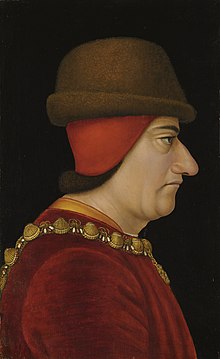Louis XI
| Louis XI the Prudent | |
|---|---|
 Louis XI wearing his Order of Saint Michael | |
| King of France | |
| Reign | 22 July 1461 − 30 August 1483 |
| Coronation | 15 August 1461, Reims |
| Predecessor | Charles VII |
| Successor | Richard III of England (disputed) or Charles VIII |
| Born | 3 July 1423 Bourges, Berry, France |
| Died | 30 August 1483 (aged 60) Château de Plessis-lez-Tours, France |
| Burial | Notre-Dame de Cléry Basilica, Cléry-Saint-André, near Orléans |
| Spouse | |
| Issue | Anne, Duchess of Bourbon Joan, Queen of France Charles VIII, King of France |
| House | Valois |
| Father | Charles VII, King of France |
| Mother | Marie of Anjou |
| Religion | Catholic |
Louis XI (3 July 1423 – 30 August 1483), called "Louis the Prudent" (French: le Prudent), was King of France from 1461 to 1483. His father was Charles VII and his mother was Marie of Anjou.
Born in Bourges, France, Louis was married to Margaret Stewart, daughter of James I of Scotland.
Louis rebelled against his father in 1440 as head of the Praguerie. Despite this, he was forgiven. Louis gave him the management of an area of south-east France known as the Dauphiné. There, Louis led his own political establishment and married Charlotte of Savoy, daughter of Louis, Duke of Savoy. His father did not approve of the marriage and sent an army, but Louis fled to Burgundy, where he was hosted by Charles' biggest enemy Philip the Good, Duke of Burgundy.
When Charles VII died in 1461, Louis became King of France. He earned the nicknames "the Cunning" (Middle French: le rusé) and "the Universal Spider" (Middle French: l'universelle aragne), as his enemies accused him of spinning webs of plots and conspiracies.
In 1472, the next Duke of Burgundy, Charles the Bold, fought against Louis in the Burgundian Wars. However, Louis was able to separate Charles from his English allies by signing the Treaty of Picquigny (1475) with Edward IV of England. The treaty officially ended the Hundred Years' War. With the death of Charles the Bold at the Battle of Nancy in 1477, the dynasty of the Dukes of Burgundy ended. Louis took advantage of the situation to seize numerous Burgundian territories, including Burgundy itself and Picardy.
Without direct foreign threats, Louis was able to get rid of his rebellious vassals, expand royal power, and strengthen the economic development of his country. He died on 30 August 1483, and was succeeded by his son Charles VIII.
